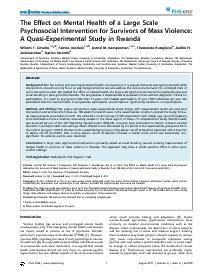The Effect on Mental Health of a Large Scale Psychosocial Intervention for Survivors of Mass Violence: A Quasi-Experimental Study in Rwanda
Background
War has serious and prolonged mental health consequences. It is argued that post-emergency mental health interventions should not only focus on psychological factors but also address the social environment. No controlled trials of such interventions exist. We studied the effect on mental health of a large scale psychosocial intervention primarily aimed at social bonding in post-genocide Rwanda. The programme is implemented at population level without diagnostic criteria for participation. It is open to any person older than 15 years, and enables participation of over 1500 individuals per year. We postulated that the mental health of programme participants would improve significantly relative to non-participants.
Methods and Findings
We used a prospective quasi-experimental study design with measurement points pre and post intervention and at 8 months follow-up. 100 adults from both sexes in the experimental condition entered the study; follow-up measurements were taken from 81. We selected a control group of 100 respondents with similar age, sex and symptom score distribution from a random community sample in the same region; of these, 73 completed the study. Mental health was assessed by use of the Self Reporting Questionnaire (SRQ-20), a twenty item instrument to detect common mental disorders in primary health care settings. Mean SRQ-20 scores decreased by 2.3 points in the experimental group and 0.8 in the control group (p = 0.033). Women in the experimental group scoring above cut-off at baseline improved with 4.8 points to below cut-off (p<0.001). Men scoring above cut-off at baseline showed a similar trend which was statistically non-significant. No adverse events were observed.
Conclusions
A large scale psychosocial intervention primarily aimed at social bonding caused a lasting improvement of mental health in survivors of mass violence in Rwanda. This approach may have a similar positive effect in other post-conflict settings.
Geachte bezoeker,
De informatie die u nu opvraagt, kan door psychotraumanet niet aan u worden getoond. Dit kan verschillende redenen hebben,
waarvan (bescherming van het) auteursrecht de meeste voorkomende is. Wanneer het mogelijk is om u door te verwijzen naar de bron
van deze informatie, dan ziet u hier onder een link naar die plek.
Als er geen link staat, kunt u contact opnemen met de bibliotheek,
die u verder op weg kan helpen.
Met vriendelijke groet,
Het psychotraumanet-team.
Reference:
Willem F Scholte, Femke Verduin, Astrid M Kamperman, Rutayisire Theoneste, Aeilko H. Zwinderman, & Karien Stronks | 2011
In: PLoS one / Public Library of Science, ISSN 1932-6203 | 6 | 8 | e21819
http://www.plosone.org/article/fetchObject.action
In: PLoS one / Public Library of Science, ISSN 1932-6203 | 6 | 8 | e21819
http://www.plosone.org/article/fetchObject.action
Keywords:
Post-Conflict Mental Heath Intervention


